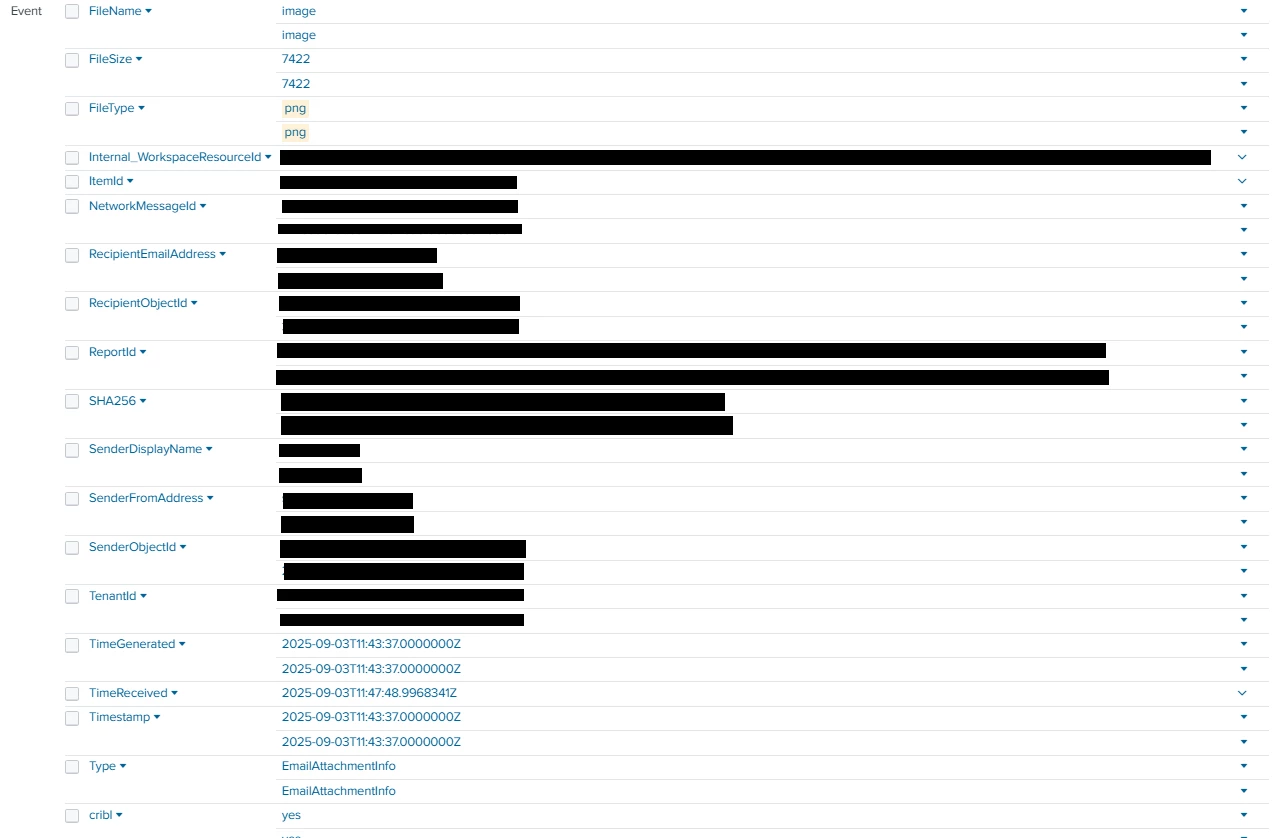Hello,
I’m using Cribl Cloud to pull JSON events from an Azure Event Hub and forward them to Splunk via HEC. Each incoming event contains a nested array field called records, for example:
{
"records": [
{
"FileName": "xx",
"FileType": "xx",
"NetworkMessageId": "xx",
"RecipientEmailAddress": "xx",
"RecipientObjectId": "xx",
"ReportId": "xx",
"SHA256": "xx",
"SenderDisplayName": "xx",
"SenderObjectId": "x",
"SenderFromAddress": "x",
"FileSize": x,
"Timestamp": "xx",
"TimeGenerated": "xx",
"_ItemId": "xx",
"TenantId": "xx",
"_TimeReceived": "xx",
"_Internal_WorkspaceResourceId": "xx",
"Type": "xx"
},
{
"FileName": "xx",
"FileType": "xx",
"NetworkMessageId": "xx",
"RecipientEmailAddress": "xx",
"RecipientObjectId": "xx",
"ReportId": "xx",
"SHA256": "xx",
"SenderDisplayName": "xx",
"SenderObjectId": "x",
"SenderFromAddress": "x",
"FileSize": x,
"Timestamp": "xx",
"TimeGenerated": "xx",
"_ItemId": "xx",
"TenantId": "xx",
"_TimeReceived": "xx",
"_Internal_WorkspaceResourceId": "xx",
"Type": "xx"
},
{
"FileName": "xx",
"FileType": "xx",
"NetworkMessageId": "xx",
"RecipientEmailAddress": "xx",
"RecipientObjectId": "xx",
"ReportId": "xx",
"SHA256": "xx",
"SenderDisplayName": "xx",
"SenderObjectId": "x",
"SenderFromAddress": "x",
"FileSize": x,
"Timestamp": "xx",
"TimeGenerated": "xx",
"_ItemId": "xx",
"TenantId": "xx",
"_TimeReceived": "xx",
"_Internal_WorkspaceResourceId": "xx",
"Type": "xx"
}
],
"_time": 1756902850.057,
"cribl": "yes",
"security_event_hub": "yes"
}My goal is to split each element of the records array into a separate, flat event. Here’s what I’ve tried:
-
Unroll on records to produce individual events
-
Flatten to promote nested fields and delete records array
In Splunk, each field’s values are duplicated (and sometimes triplicated), as shown here: (censored values are equals between them)

I’ve identified that extracting nested values is causing this anomaly in Splunk.
I’ve tried numerous approaches to resolve it:
-
Replaced the Flatten function with an Eval expression like that:
Object.assign(__e, Object.assign({}, __e, __e.rec || {})); delete __e.rec; delete __e.records; -
Tested various JavaScript snippets in Code functions
-
Used JSON Unroll and JSON Decode functions
-
Toggled KV_MODE, AUTO_KV_JSON, and INDEXED_EXTRACTIONS on Heavy Forwarders and Search Heads
None of these solutions work consistently; in some cases values were even triplicated.
Do you have any suggestions to resolve this issue?
Thank you in advance for any insights or working examples.
